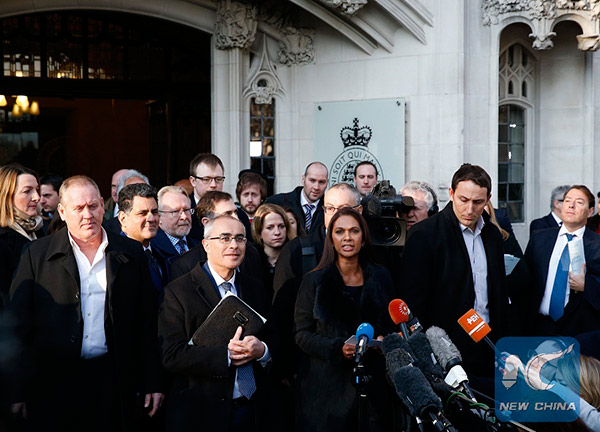
Investment manager Gina Miller speaks outside the British Supreme Court in London, Britain, Jan. 24, 2017. The British Supreme Court on Tuesday ruled that Prime Minister Theresa May must consult Parliament before triggering formal negotiations on Britain leaving the European Union. (Xinhua/Han Yan)
LONDON, Jan. 26 (Xinhua) -- The British Government laid a brief bill before parliament Thursday to pave the way for Britain's exit from the European Union.
There was no debate when the bill, taking up just two sentences, was formally presented in a process that took less than one minute.
The Leader of the House of Commons David Lidington announced that there will be five days of parliamentary debate before a vote is taken.
David Davis, the government's main Brexit minister, said in a statement: "The British people have made the decision to leave the EU and this government is determined to get on with the job of delivering it."
"So today we have introduced a Bill in Parliament which will allow us to formally trigger Article 50 by the end of March. I trust that Parliament, which backed the (June 23) referendum by six to one, will respect the decision taken by the British people and pass the legislation quickly."
A number of pro-EU members of parliament have already indicated they plan to table a range of amendments to the bill.
The Scottish Nationalist Party (SNP) has said it will vote against the bill, while the leader of the minority Liberal Democrats Tim Farron has said his party will oppose it unless there is a guarantee of a second national referendum on the terms of the final deal Westminster makes with Brussels.
Jeremy Corbyn, leader of the main opposition Labor Party, has said Labor MPs will be told to vote in favor of the bill to enable the government to trigger article 50.
Labor's Shadow Foreign Secretary Emily Thornberry said: "We will not get in the way of it, but we will try and amend the legislation in order to ensure that they keep coming back, that we keep an eye on them. And, if necessary, there will be hand-to-hand combat on this."
But a number of Labour MPs, reported to be as many as 60, have threatened to disobey Corbyn's instruction and vote against, deepening the continuing rift between the leader and opponents within his own ranks.
Political commentators in London say it could lead to a number of Labour shadow ministers resigning over the issue.
Within minutes of details being published there were claims by some politicians that they were being gagged by the government in the way the process was being handled.
Labour MP Ben Bradshaw said on social media the restriction of debate on the bill to just a few days was a disgrace.
The Daily Mail newspaper said battle lines had been drawn with the publication of the article 50 bill.
Parliament is in an unprecedented position in that it is being asked to vote for Brexit - something 75 percent of MPs are opposed to, according to BBC.
Constitutional expert Vernon Bernard Bogdanor said in a media interview Thursday that the House of Lords will be more of a problem for the government because it does not have a majority there.
Bogdanor said Prime Minister May could call a general election if the House of Lords tried to thwart the legislation.
Official papers announced the bill will be debated in the House of Commons on Tuesday and Wednesday, with further debates the following week.
It will also have to be approved by the House of Lords where it could face more opposition.
Once it has completed its passage through both houses of parliament, Queen Elizabeth will add her signature, giving legal Royal Assent to the bill.
The aim of the government is for the whole process to be fast tracked, to be completed within weeks to enable Prime Minister Theresa May to trigger article 50, the process for exiting the EU, before the end of March.
May had hoped to trigger article 50 without parliamentary approval, but the Supreme Court has ruled that the government must first seek parliamentary agreement.
Official documents summarize the brief bill saying it is a "bill to confer power on the Prime Minister to notify, under Article 50 of the Treaty on European Union, the United Kingdom's intention to withdraw from the EU."
Related:
British Supreme Court rules Parliament must be given vote on Brexit
LONDON, Jan. 24 (Xinhua) -- The British Prime Minister Theresa May can't trigger Britain's exit from the European Union without first getting the approval of the British Parliament, according to a Supreme Court ruling on Monday.
Judges in the Supreme Court in London ruled by a margin of eight to three in favor of a group of individuals who challenged the government's insistence that it could trigger the article 50 process to leave the EU. Full Story